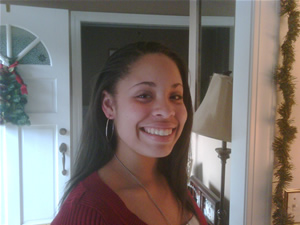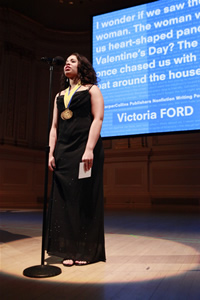A Place to Stay
Victoria Ford, a child of the Memphis political dynasty, survived her parents’ disgrace to stand on a stage in Carnegie Hall and accept a national writing award
“You may not understand this now, but she isn’t coming back. Not tonight. Not tomorrow. Day after that. And no, she hasn’t left anything behind—a sticky note on the refrigerator door or a quick message for the answering machine, her voice a distant echo calling your name and mine. Nothing.”
 So begins the award-winning essay “To a Restless Little Brother Calling for Mama in His Sleep,” one of the five essays that last month helped Victoria Ford, eighteen, win a national Scholastic Art and Writing Award—and a $10,000 college scholarship. Past winners of the prestigious award include Sylvia Plath, Joyce Carol Oates, and Truman Capote. For Ford, the awards ceremony, held May 31 in New York City’s Carnegie Hall, was a moment to remember, one that surely marks the beginning of a life of creativity and success.
So begins the award-winning essay “To a Restless Little Brother Calling for Mama in His Sleep,” one of the five essays that last month helped Victoria Ford, eighteen, win a national Scholastic Art and Writing Award—and a $10,000 college scholarship. Past winners of the prestigious award include Sylvia Plath, Joyce Carol Oates, and Truman Capote. For Ford, the awards ceremony, held May 31 in New York City’s Carnegie Hall, was a moment to remember, one that surely marks the beginning of a life of creativity and success.
Victoria’s last name might not be so well known as the literary giants who took home the Scholastic prize years ago, but it already carries a kind of notoriety in her hometown of Memphis. Harold Ford Sr., the first African-American Tennessean elected to Congress since Reconstruction, was her uncle. Harold Ford Jr., now retired from Congress, is her cousin. Other family members have been elected to the city council, the county commission, and the school board in Memphis. Victoria’s father, John Ford, was a state senator for three decades, another cog in the familial political machine.
Among young African Americans growing up in Memphis, Victoria’s story is far from typical. Memphis is a city with higher-than-average rates of poverty, drug use, single-parent homes, and criminal recidivism, but Victoria grew up in a two-story brick home with a mother and father. She attended an above-average city school.
All families have skeletons, however, and all families weather their own storms. The problems of Victoria’s family were played out on television newscasts and above the fold on the front pages of daily newspapers in the state: in 2005, FBI surveillance caught John Ford accepting a bribe which would amount to $55,000 when all was said and done. During Victoria’s childhood, her mother, Tamara Mitchell-Ford, was imprisoned three times on DUI charges. In 2008, when John Ford finally reported to federal prison, Tamara Mitchell-Ford was already in a state penitentiary.
 Victoria now lives in Greenville, South Carolina, with her aunt, Megan Mitchell-Hoefer, in a lively home with six other family members and “always something to write about.” She attended the South Carolina Governor’s School for the Arts and Humanities, a school that her fiction teacher, novelist George Singleton, describes as being a lot like “that bad TV show Fame.” Prospective students must interview and audition and present portfolios of creative work, he says, “so it’s hard to get in.”
Victoria now lives in Greenville, South Carolina, with her aunt, Megan Mitchell-Hoefer, in a lively home with six other family members and “always something to write about.” She attended the South Carolina Governor’s School for the Arts and Humanities, a school that her fiction teacher, novelist George Singleton, describes as being a lot like “that bad TV show Fame.” Prospective students must interview and audition and present portfolios of creative work, he says, “so it’s hard to get in.”
“She’s very well-rounded and balanced,” says her aunt, Mitchell-Hoefer. “She’s very family-oriented, she’s a homebody.” This, despite an atypical family home. Also atypical is the way Victoria deals with the spotlight, the skeletons. Her essays tell the story from her point of view, from that of her brothers and sister. They are emotional and impart details from within the home and, in some instances, within the very closet where she has struck up a conversation with those bones. She is candid, unapologetic, sad, and hopeful. She misses her father; she worries for her mother.
Tamara Mitchell-Ford was pregnant with Victoria’s brother, called Johnjohn, when she went away to the correctional center for the first time—“her vacation, as she liked to call it,” Victoria recounts in an essay titled “Like Nothing Else In The Known World.” It’s an essay in which she also writes of her brother’s birth and how quickly she, even as a preteen, learned to change diapers and babysit for ever-increasing amounts of time.
“I bounced Johnjohn in my arms before his nap,” she wrote. “He cried, tears running down his cheeks and over his dimples. I learned that he just needed a rhythm. I’d lay him across my stomach, hold his head close to my chest, and pat his butt. Sometimes I sang. Once he fell asleep, I’d be gone with him.” The essay ends with Victoria’s discovery of empty bottles of booze hidden around the house, and with finding her mother in a car left running in the garage.
It’s easy to understand her protectiveness toward the now six-year-old Johnjohn and why she considered putting off college for a year or two to look after him. Advice from her teachers and aunt changed her mind: “I had a long conversation with my teachers at the Governor’s School about it—we’re very close—and my teachers said, ‘It will work out; your brother will have a place to stay; you have to go to college; you have to get an education.’ They were really supportive.”
Mitchell-Hoefer, whom Victoria calls “a hero,” echoed the faculty: of course Johnjohn would stay with her.
This fall Victoria will be part of the first-year class at the University of Pennsylvania. “I was very set on going to a school in North Carolina to stay close to home because I really wanted to be with my little brother,” Victoria said. “When I got into Penn, I thought, ‘I think this is right.’ I need to be someplace that’s big and someplace that has lots of different types of people and different programs that I can immerse myself into.”
Victoria puts a happy face on nothing that happened before she got to South Carolina and the safe confines of her aunt’s home. In “Letter To My Father,” she is probably the most blunt: “I just don’t feel like I know you as much as I want to” and follows it with “rather, the internet knows more about you than your own daughter.” She cites a Wikipedia article and blogs that contain no mention of his children. What comes through in Victoria’s writing is a painfully honest innocence. She loves her family, but she doesn’t ask readers to forgive them, or even understand their shortcomings.
To help the healing, she reads the poets Larry Levis, Matthew Dickman, Langston Hughes, and Walt Whitman, and the fiction of Richard Ford, yet she is still unsure about her career path, undecided as to a college major, though she is certain that writing will be involved. Singleton thinks he sees the future: “She’s won most of her accolades in non-fiction and poetry, but I kind of think she’s a stronger fiction writer. In years to come, I would imagine she would be writing fiction.”
That’s an opinion shared by her aunt, the elementary-school principal who knows promise when she sees it and imparts sound advice for anyone considering a creative vocation: “I think that she’s going to dibble and dabble in other areas, but I think she’s going to come back around to writing. It is something that she is passionate about, she loves it; anything you love, no matter how much money you may make doing it, you’ll always be a happier person when you’re doing what you love.”



